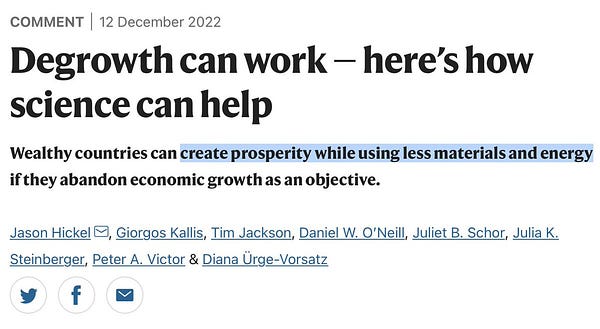
It has become fashionable over the past decade to promote the idea of “degrowth” — or if you wish to sound smart at a dinner party, décroissance. On Monday, Nature published a call to “degrowth,” claiming that “degrowth can work” and “wealthy countries can create prosperity while using less materials and energy if they abandon economic growth as an objective.”
As they say — Big, if true.
Let’s start with what “degrowth” actually means. Here, there is a lot of confusion, not least among advocates of degrowth. The Nature article this week leads with a policy objective: “Wealthy economies should abandon growth of gross domestic product (GDP) as a goal . . . “. But elsewhere, in an article titled “What does degrowth mean? A few points of clarification” the lead author of this week’s Nature commentary explains:
It is important to clarify that degrowth is not about reducing GDP, but rather about reducing throughput.
If the central concept of your economic theory requires an entire paper to clarify that it doesn’t mean what you think it means, you might rethink the concept. But I digress.
So “degrowth” — which literally in the English language means reducing growth — may not actually mean reducing growth. In fact, “degrowth” according to another clarification might not have anything at all to do with GDP: “Degrowth is about reorganizing the economy to meet people’s needs regardless of what happens with GDP.” Still others explain that “degrowth” simply means getting more from less — which actually is the definition of “growth.”
One might be forgiven for thinking that “degrowth” — and by that, I mean, décroissance — might just be a code word for elite snobbishness. Consider that the sorts of activities that have been judged unnecessary in human society by degrowthers include many that are central to the American middle class.
What economic activities are judged as needing to be eliminated due to being “socially less necessary, and therefore need to shrink”?
“fossil fuels, sport utility vehicles (SUVs), fast fashion, advertising, planned obsolescence, McMansions, industrial beef, personal vehicles, private jets, food waste, cruise ships, the military–industrial complex, etc”
Setting aside the American middle class, Branko Milanovic has written more generally and bluntly about the contradictions of degrowth — whatever it actually means:
The difficulty of discussion with degrowers comes from the fact that they and the rest of us live in two different ideological worlds. Degrowers live in a world of magic, where merely by listing the names of desirable ends they are supposed to somehow happen. In that world, one does not need to bother with numbers or facts, trade-offs, first or second bests; one merely needs to conjure up what he/she desires and it will be there.
Milanovic wisely does some smart and simple math:
The “problem” is that the median after-tax income in the West (about $14,600 per person per year) is at the 91st percentile of the global income distribution. Clearly, if we let 90 percent of people increase their incomes to that level, this would “burst” our GDP envelope several times over (2.7 times to be exact). We cannot be this “generous”. Let us suppose next that we let everybody reach only the income level that is slightly higher than the Western 10th percentile, exactly that of the 13th Western percentile ($5,500 per person per year). Now, by a “lucky accident”, Western 13th percentile coincides with the global mean income, which is at the 73rd global percentile. We could bring up all the bottom 72 percent, but we also have to reduce incomes of everybody above so that the entire world lives at the global mean.
How much of a reduction would this imply for the global top 27% (those with incomes above the global mean)? Their incomes would have to be cut by almost two-thirds. Most of them, as we have said, live in the West. The immizeration of the West would not take place through transfers to the poor: we have “allowed” them to produce and earn more. The immizeration of the West would take place through gradual and sustained reduction of production and income until everybody who is “rich” loses sufficiently so that they drop to the level of the global mean. On average, as have seen, this is about two-thirds, but the very rich would have to lose more: the global top decile would have to lose 80%; the global top ventile (richest 5%) would have to lose 84%: and so on. Factories, trains, airports, schools would work one-third of their normal time; electricity, heating and hot water would be available for 8 hours a day; cars may be driven one day out of three; we would work only 13 hours per week (to make Keynes happy to have guessed correctly in his “Economic possibilities for our grandchildren”) etc.—all in order to produce only a third as many goods and services that the West is producing now.
Stop for a moment to consider the enormity of what is being proposed here.
Advocates of degrowth have explained what they envision in examples of societies that have degrown:
[D]egrowth brings together diverse ideas about, and examples of, non-growing economies. Overgrown societies can learn from Indigenous peoples, peasant societies, ancient civilizations, our grandparents, the poor, and other movements from the tapestry of alternatives.
While there is a lot to unpack here, I’ll just pick out “grandparents” from the above list and recommend that everyone drop everything and watch Hans Rosling below on his grandmother and the “magic washing machine” — some lessons to be learned there for sure:
Long-time readers and followers will well know that the notion of “degrowth” (however defined) runs right into what I have called the “iron law of climate policy.” That’s the main reason that I haven’t devoted much energy to the topic. “Degrowth” is a perfect issue for classroom discussions, but it sits far outside the Kuiper Belt when it comes to policy relevance. You can read my most recent piece of this topic (2011) here. My views have not changed.
It seems clear that everyone acknowledges that degrowth is not politically popular. No politician has gained office (that I am aware of) anywhere in the world on a platform of degrowth. Indeed, as the Nature commentary observes this week:
[P]olitical parties that have put forward degrowth ideas have received limited support in elections. That begs the question: where would the drive for degrowth policy come from?
It is a good question.
I’m all for discussions of increasing social justice, greater income equality (and other types of equality), accelerating decarbonization, increasing the dematerialization of human activity, protecting biodiversity, eliminating poverty and more. These are incredibly important policy aims. After spending the past two weeks in South Africa I am even more aware of them.
Such discussions are of critical importance. Let’s not be distracted by a slogan.






Alex Epstein as if cutting a Gordian Knot cuts through all these variants of anti humanity, by distinguishing those philosophers who measure progress, prosperity and morality in terms of human flourishing, versus those, now fashionable, thinkers who measure progress in terms of reducing impact or returning to nature.
For example, naturally occurring fresh water is laden with sediment, bacteria, by products of decomposition etc. Progress is serving billions a day with much cleaner municipal water. One metric rates that a win, the other a loss.
In my view, the degrowth people present a genuine conundrum that policy experts should confront explicitly. The degrowth idea is that there is not enough energy, mineral or ecological resources on the planet for all humans to arrive at the same level of consumption as even the lower quintiles of the developed nations. Humans are increasingly in what Jason Hickel calls “transgression of biophysical boundaries.”
This is basically the current version of Malthusianism. So far, the Malthusians have consistently underestimated the potential of technological innovation. But the argument that humans are blindly heading into irreversible ecological overshoot remains compelling. It is a very likely scenario.
I think Jason Hickel wholly agrees with Milanovic’s math. He then does what Malthusian’s have always done, which is to start choosing the winners and losers from a top-down ideological framework. You can see that in the linked Nature article. “Government action is crucial. This is a challenge, because those in power have ideologies rooted in mainstream neoclassical economics, and tend to have limited exposure to researchers who explore economics from other angles.”
Here's my point. Climate change and resource scarcity are genuine predicaments created by the fossil fuel age--- predicaments for which there may not be a good way to avoid tragedy. So we need to make a choice at the highest ethical level. Do we let the environmentalists continue their classist project of creating food and energy scarcity for the global poor. Or, do we explicitly embrace the goal of abundant-energy-for-all humans, even as we recognize the uncertainties of this techno-optimistic approach?